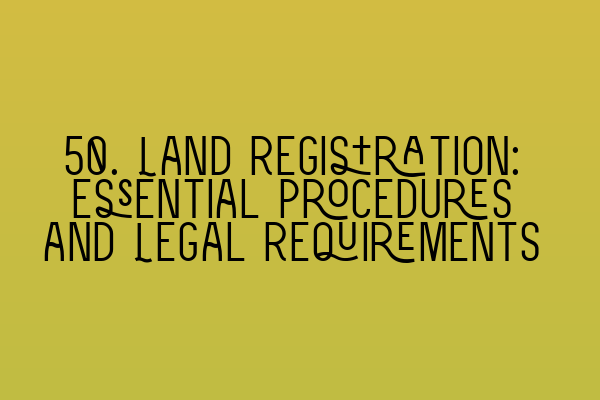50. Land Registration: Essential Procedures and Legal Requirements
In the realm of property law, one of the fundamental aspects that both solicitors and clients need to understand is land registration. Land registration is the process of officially recording the ownership and interests in land, providing security, certainty, and transparency in property transactions. This blog post will delve into the essential procedures and legal requirements of land registration, guiding you through the intricacies of this critical aspect of property law.
When it comes to land registration, there are several key steps that need to be followed to ensure a smooth and legally valid process. Let’s explore these steps in detail:
1. Conducting a Title Search:
Before proceeding with any land transaction, it is crucial to conduct a thorough title search. This involves examining the title registers and title plans held by the Land Registry to verify ownership, interests, and any existing charges or restrictions on the property. Conducting a comprehensive title search helps identify potential issues that may affect the transaction and allows for appropriate due diligence.
2. Preparing and Submitting an Application:
Once the title search is complete and all necessary information is gathered, the next step is to prepare and submit an application for registration. This application includes providing complete and accurate details about the property, the parties involved, and the nature of the transaction. Failing to provide accurate information may lead to delays or even rejection of the application.
3. Paying the Appropriate Fees:
Land registration incurs certain fees that need to be paid at the time of application submission. These fees vary depending on factors such as the value of the property and the type of transaction. It is essential to ensure that the correct fees are paid to avoid any complications in the registration process.
4. Ensuring Compliance with Legal Requirements:
Land registration is subject to various legal requirements that must be fulfilled to ensure a valid and enforceable registration. These requirements include compliance with the Land Registration Act 2002, which sets out the rules and procedures for land registration in England and Wales. Additionally, adherence to specific regulations, such as the requirement for consent to transfer in certain circumstances, is crucial to avoid any legal pitfalls.
5. Dealing with Notices and Restrictions:
During the land registration process, it is common to encounter notices and restrictions that affect the property. Notices serve as official notifications to interested parties about specific matters, such as pending legal proceedings or leasehold interests. Restrictions, on the other hand, impose limitations on the registered owner’s ability to deal with the property, such as restrictions on further disposition or development. It is essential to fully understand and address any notices and restrictions to ensure a smooth registration process.
6. Completion and Registration:
Once all necessary steps have been taken, and any outstanding matters have been resolved, the final step is to complete the land transaction and register the property. Registration provides the parties involved with legal certainty and protection against third-party claims. It is crucial to ensure that all documentation is accurately completed, signed, and witnessed, as any errors or omissions may result in delays or even void the registration.
By following these essential procedures and legal requirements, you can navigate the intricacies of land registration and ensure a valid and legally enforceable transaction. Working with a qualified solicitor who specializes in property law can provide invaluable guidance and expertise throughout the process.
At SQE Property Law & Land Law, we offer comprehensive legal services to assist you with all your land registration needs. Our team of experienced solicitors understands the complexities of land registration and can provide expert advice and assistance to ensure a seamless process.
For further resources and preparation materials on property law and land law, we invite you to explore the following related articles:
– SQE 1 Practice Exam Questions: Test your knowledge and understanding with our SQE 1 practice exam questions, designed to help you prepare for the Solicitors Qualifying Examination (SQE) 1.
– SQE 1 Practice Mocks FLK1 FLK2: Access our SQE 1 practice mocks FLK1 FLK2 to familiarize yourself with the exam format and enhance your exam performance.
– SQE 2 Preparation Courses: Prepare for the SQE 2 examination with our comprehensive SQE 2 preparation courses, tailored to provide you with the knowledge and skills required for success.
– SQE 1 Preparation Courses: Enhance your understanding of property law and other key areas with our SQE 1 preparation courses, designed to support your exam preparation journey.
– SRA SQE Exam Dates: Stay updated with the latest SRA SQE exam dates to ensure timely registration and effective exam planning.
By leveraging our expertise and resources at SQE Property Law & Land Law, you can confidently navigate the intricacies of land registration and achieve successful outcomes in your property transactions. Contact us today to learn more about our services and how we can assist you.
